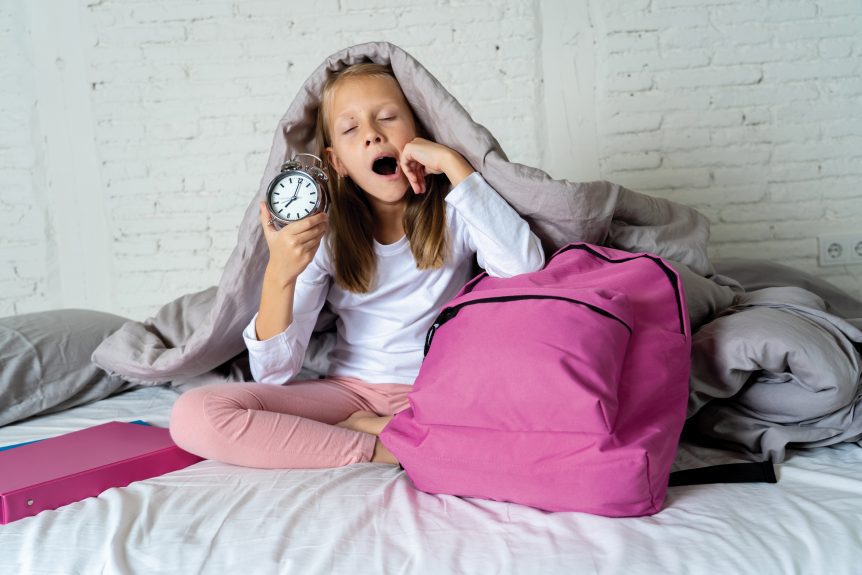Written by Michelle Yetman, PhD, Licensed Clinical Psychologist and Clinical Assistant Professor, LSU Health Shreveport School of Allied Health Professions – Children’s Center
 After months of being locked in, parents’ nerves are beginning to fray. Not being able to go to the movies, go out to dinner with friends, and desperately trying to work productively from home while the kids constantly interrupt and the dog barks during your virtual video meeting has taken its toll! Your average parents have found themselves in the role of teacher, lunch lady, P.E. coach, art director, and principal in charge of discipline. Managing all of this, while trying to work full time, has caused many parents to have a short fuse and little patience. While summer is a welcome relief from schoolwork, the thought of going into another school year with children at home, even part-time, has left many parents feeling apprehensive.
After months of being locked in, parents’ nerves are beginning to fray. Not being able to go to the movies, go out to dinner with friends, and desperately trying to work productively from home while the kids constantly interrupt and the dog barks during your virtual video meeting has taken its toll! Your average parents have found themselves in the role of teacher, lunch lady, P.E. coach, art director, and principal in charge of discipline. Managing all of this, while trying to work full time, has caused many parents to have a short fuse and little patience. While summer is a welcome relief from schoolwork, the thought of going into another school year with children at home, even part-time, has left many parents feeling apprehensive.
While anxiety and uncertainty are part of the COVID-19 pandemic, there are numerous things families can do to manage their home situation and promote good mental health for their family.
Structure & Routine: While tensions from the fallout of the pandemic rise and the world seem increasingly chaotic, children’s needs for structure and routine remain unchanged. Whether they are going to school or learning virtually, children should have a structured day, with consistent sleep/wake times, mealtimes, playtime (both outside and inside), etc. Better yet, think like a preschool teacher and post the schedule. It helps to know what we should be doing and when. Use timers! If dinner is at 6 p.m., the timer should go off at 5:30 p.m. so we can all clean up and start helping to get dinner ready. This way, it is not Mom telling you to stop your video game but it is the timer reminding you it is time to get ready for dinner.
Sleep: Not enough can be said about this topic. We are a sleep-deprived nation and we have the short tempers to show for it. Lack of sleep affects our ability to cope and deal with stress, as well as prevent and fight off infections. Most of us significantly underestimate how much sleep is required for adults and children. To find out just how much sleep each member of your family needs based upon age, check out the National Sleep Foundation website, www.thensf.org. In addition, make sure your child has a bedtime routine (e.g., brushing teeth, reading a book together, saying prayers, tucking into bed) in order to help them transition into sleep.
Exercise: Keeping everyone active during the day will help with an easier bedtime at night. Play is a child’s form of exercise, so get creative. Take walks while playing “I Spy,” play tag and hide ‘n’ seek, have relay races, and go on bike rides.
Manage Expectations: Every parent is worried about their child’s education and many felt the online virtual experience was less than ideal when the sudden shift occurred in the spring. While events unfold this fall, just remember that there are so many things that can be learned outside of a classroom that parents can teach their children. Cooking is an important life skill that also incorporates math and chemistry. Money management skills, such as budgeting and saving, can be taught through an allowance program linked to chores or other work around the house. Parents may need to adjust their expectations for learning, but remember that life is a long journey with many opportunities to learn.
Play as a Family: While the pandemic will pass, the opportunity to be this close as a family may never return. Take advantage of it by having “theme nights.” For example, have a board game night on Wednesday, Taco Tuesday, movie night on Friday. By creating “theme nights,” you prevent the phenomenon of “groundhog day” where every day feels the same. Have a family meeting and let the kids decide what kind of theme nights they would like to have. These evenings can create real bonding opportunities and lasting family memories.
Communicate: Parents should be mindful of having the television news on when kids are in the room. Some children may not be developmentally mature enough to process what they are seeing and hearing in a healthy way. This could further exacerbate the anxiety that your child may already be feeling from the changes in their own lives. Therefore, it is important to talk with our kids and have regular “check ins.” Simply getting together regularly for meals as a family can accomplish this. This provides an opportunity to discuss how everyone is feeling and coping with stress.
Of course, if you feel that you or your child might benefit from talking to a mental health professional, there are a number of community resources available from the LSU Health Department of Psychiatry & Behavioral Medicine that can be found online at www.lsuhs.edu.

